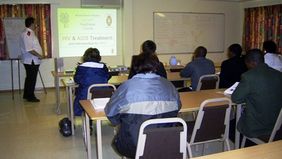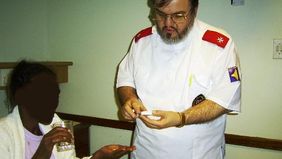Qalile Uhlelo*, a 39-year-old woman, came to Blessed Gérard's Hospice in August 2004 asking for help. She was very ill and had all kinds of opportunistic infections. She openly admitted that she was HIV positive. She had heard that we had started an antiretroviral treatment programme.
Qalile had her first preliminary interview. She answered all our questions without reservation. She lives in the Mandeni area and is determined to survive. Her employer fully supported her and encouraged her to seek treatment.
In early September, we took her blood for a complete blood count. The shock followed when we received the test results: With a CD4 count of 1 cell/mm³ and a high viral load of 90536 viruses/ml, it was almost unbelievable that she was still on her feet. An HIV negative person has 800-1300 cells/mm³.
We offered Qalile inpatient admission at Blessed Gérard's Hospice because of her poor health. She agreed. Qalile was a model patient and did everything that was asked of her. Antiretroviral treatment is not as simple as taking pain pills and requires thorough patient information and commitment on the part of the patient. Therefore, it is a requirement that all candidates for the HAART programme receive four weeks of training to learn, accept and later comply with all aspects of treatment.
The first week of the treatment course began. It was Tuesday morning and everything was ready. Unfortunately, Qalile developed a bad case of diarrhoea. Our doctor prescribed the necessary medicine to get this under control, but it didn't help. Qalile became weaker and we were afraid that her life was in serious danger. But then slowly, day by day, she responded a little more to the treatment. We had stopped the diarrhoea, but now she developed peripheral neuritis and could no longer walk. It was too painful for her to put her feet on the ground.
Qalile did not give up her fight. She overcame her opportunistic infections to such an extent that our doctor decided to let her catch up on what she had missed in the preparatory course by private "tutoring". She showed such great and contagious enthusiasm that it inspired other patients, the doctor, nurses and caregivers and they too continued to encourage her. The second week of the course came and went without any further problems, as did the third and fourth weeks. Now the time had come to make her treatment plan together with the doctor: At what time each day can she take her medicine? Where and in which container will she keep the medicine? Qalile answered all the questions under the doctor's guidance.
After completing this process, it was time to read and understand the treatment contract. This was explained to her in great detail. Qalile listened carefully as she was asked to commit to living a positive, healthy life and to comply with the HAART programme. Qalile's heart pounded with joyful anticipation as she signed the contract. The director of the hospice also signed, promising to give her the medication and support her physically, psychologically and emotionally. Now the time had come! Qalile's life-prolonging medication arrived.
Day 1: Qalile was doing well.
Day 2: Qalile had mild nausea.
Day 3: Qalile started vomiting.
Day 4: Qalile felt well.
Day 5: Qalile felt a little stronger.
Day 6: Qalile was discharged home.
Day 10: Qalile returned to the hospice for a follow-up. She was not feeling too well. So they decided to admit her as an inpatient again. Qalile's immune system started working again and was causing difficulties.
Day 17: We decided to do some more blood tests to see how Qalile's condition was really improving. Her CD4 count had risen to 8 cells/mm³. She was on the road to recovery. We nursed her through this initial period of immune reconstitution and when she was over it, we discharged her back home. Qalile came to our doctor every week from then on for her follow-up. On 3 November we did another blood test. This time the CD4 value had risen to 18 cells/mm³. This is still considered extremely low, but it indicates an improvement. It was interesting to see the viral load which had dropped to 74 viruses/ml and that is a great result.
Qalile continues to get a little better every day. On 6 December, her CD4 count was 39 cells/mm³. She is still an exemplary patient and does everything she is told. Thank you, Qalile, for your encouragement and for proving how well our HAART programme can work to significantly improve the quality of life of HIV/AIDS patients.
* This is a true story, but the name is fictitious for privacy reasons.


